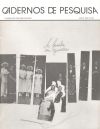A revolução de 30, a família e o trabalho feminino
Keywords:
Trabalho, Famílias, Legislação trabalhista, Estado NovoAbstract
O objetivo deste texto é compreender como a legislação sobre o trabalho feminino - desde 1932 até a Consolidação das Leis do Trabalho, na década seguinte - foi parte do projeto autoritário do Estado, dirigindo-se mais diretamente à família. A ordenação jurídica do trabalho feminino, na legislação de 32 e depois sob o Estado Novo, implicou na defesa de um certo tipo de família patriarcalmente constituída e significou a opressão das mulheres, através de sua dessexualização e identificação no papel de "mãe". A análise da Legislação é acompanhada do exame de conteúdo do Boletim do Ministério do Trabalho, Indústria e Comércio, publicado a partir de 1934.Downloads
Downloads
Published
How to Cite
Issue
Section
License
Copyright (c) 2013 Cadernos de Pesquisa

This work is licensed under a Creative Commons Attribution-NonCommercial 4.0 International License.
Authors who publish in this journal agree to the following terms:
a. Authors retain the copyright and grant the journal the right to first publication, with the paper simultaneously licensed under the Creative Commons Attribution license that allows the sharing of the paper with acknowledgment of authorship and initial publication in this journal.
b. Authors are authorized to assume additional contracts separately, for non-exclusive distribution of the version of the paper published in this journal (for example publishing in institutional repository or as a book chapter), with acknowledgment of authorship and initial publication in this journal.
c. Authors are allowed and encouraged to publish and distribute their paper on-line (for example in institutional repositories or on their personal page) at any moment before or during the editorial process, as this can generate productive changes, as well as increase the impact and citation of the published paper (See The Effect of Open Access).









